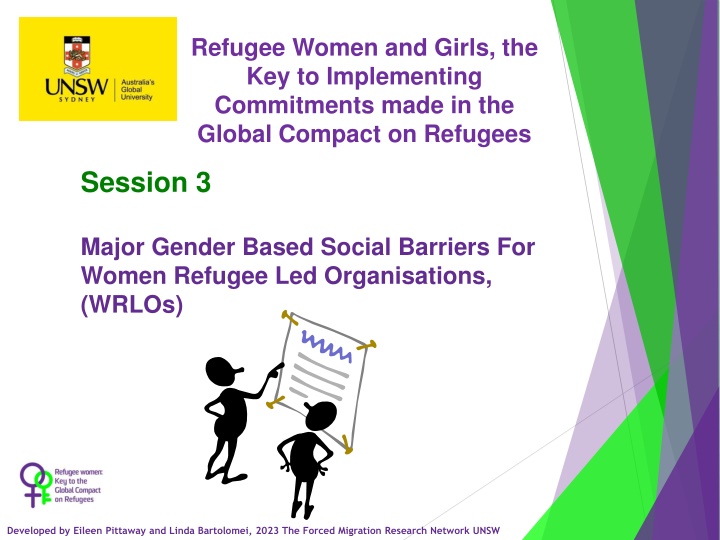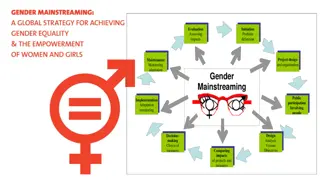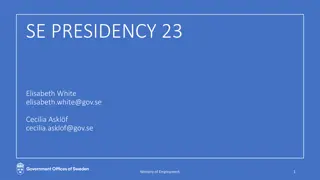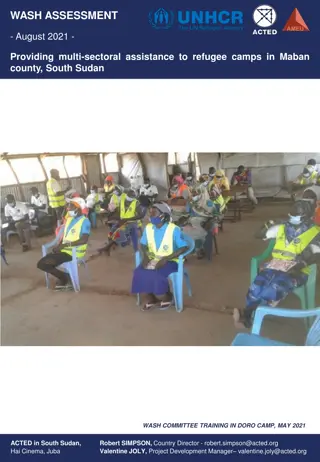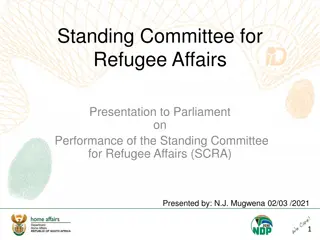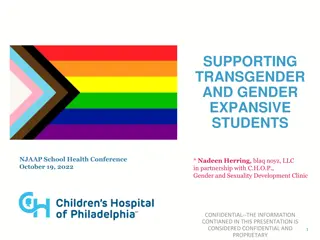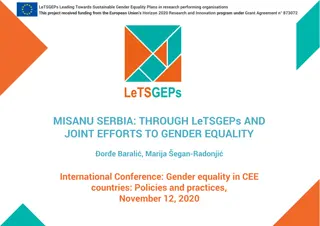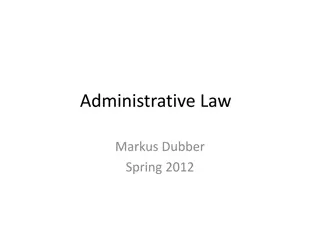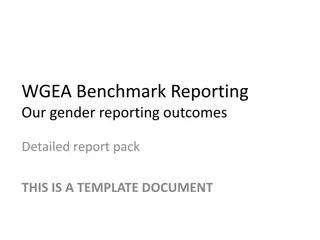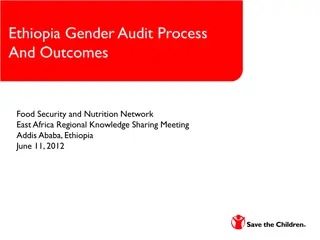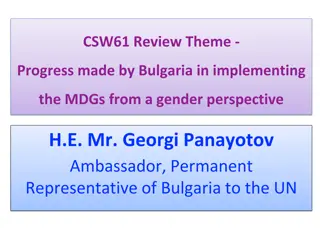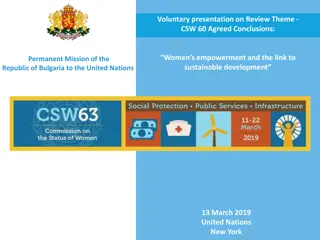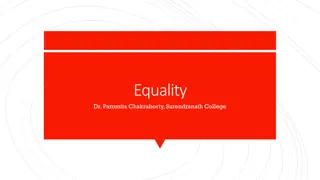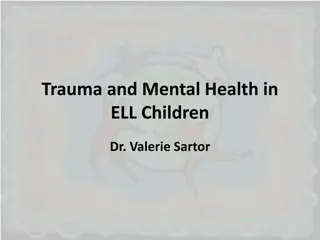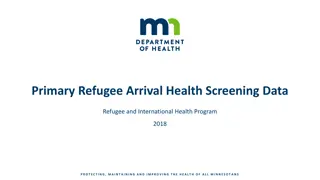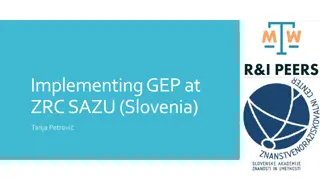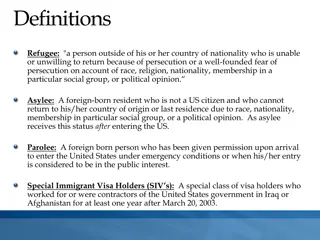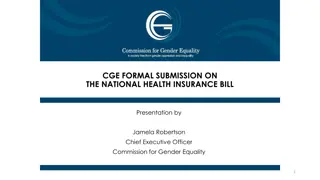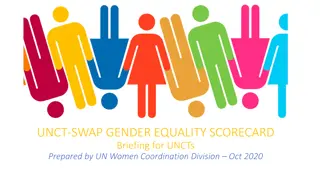Gender Equality in Refugee Contexts: Breaking Social Barriers
In this session, insights are shared on gender equality challenges faced by women refugees, highlighting their strengths and resilience. Emphasis is put on addressing unique needs and combating systemic gender-based violence in refugee settings.
Download Presentation

Please find below an Image/Link to download the presentation.
The content on the website is provided AS IS for your information and personal use only. It may not be sold, licensed, or shared on other websites without obtaining consent from the author.If you encounter any issues during the download, it is possible that the publisher has removed the file from their server.
You are allowed to download the files provided on this website for personal or commercial use, subject to the condition that they are used lawfully. All files are the property of their respective owners.
The content on the website is provided AS IS for your information and personal use only. It may not be sold, licensed, or shared on other websites without obtaining consent from the author.
E N D
Presentation Transcript
Refugee Women and Girls, the Key to Implementing Commitments made in the Global Compact on Refugees Session 3 Major Gender Based Social Barriers For Women Refugee Led Organisations, (WRLOs) Developed by Eileen Pittaway and Linda Bartolomei, 2023 The Forced Migration Research Network UNSW
Aim of the session The aim of the session is to use our understanding of the broad meaning of gender equality and analyse this in the context of refugee women and girls and WRLOs. Intellectual property of E Pittaway and L. Bartolomei; Reuse is permitted with author attribution
Gender Based Social Barriers faced by Women Refugees - A useful Definition. This is drawn from our research data and discussions with refugee women from many countries. Please feel free to add your own. Forced Displacement means that Refugee women and girls do not have even the minimal protections that should be provided by one s country of birth. This includes citizenship, access to individual registration, at times even birth certificates. They have less access to legal procedures, and services such as health and education, and no legal rights to work. They are placed into often hostile vulnerable situations, and SGBV is endemic. (See SGBV Section) Intellectual property of E Pittaway and L. Bartolomei; Reuse is permitted with author attribution
Gender equality means that all of these needs must be addressed equally! Intellectual property of E Pittaway and L. Bartolomei; Reuse is permitted with author attribution
Refugee Women and Girls: A Vulnerable Minority? For far too long, the prevailing discourse about refugee women and girls has been about a vulnerable minority. Women and girls are not a vulnerable group, nor are they a minority, constituting more than 50 percent of the diverse groups within refugee populations. While sharing with men and boys the same basic needs for food, water, shelter, sanitation and security, they do have additional and significantly different needs. The most pervasive difference is that of endemic and often systematic SGBV against women and girls, and pregnancy from rape. Men and boys also are victims of SGBV, and this generates the need for different and appropriate responses. Intellectual property of E Pittaway and L. Bartolomei; Reuse is permitted with author attribution
Refugee Women are Strong and Resilient If we focusing only on the vulnerabilities of women and girls, we create a discourse of helpless victims. In many camps and refugee sites, women run cr ches, arrange care for orphaned children, provide safe spaces for women who have experienced SGBV, manage scarce rations to ensure that families are fed, run small businesses to support their families, organize basic schools, and provide protection. Women have formal skills, as well as a wide range of informal skills, and have a huge capacity. Intellectual property of E Pittaway and L. Bartolomei; Reuse is permitted with author attribution
Both Strong and Vulnerable However, to focus only on strengths is to ignore the widespread challenges, discrimination and abuse that refugee women and girls survive. They are simultaneously strong and resourceful, victims and marginalized. We must address structural vulnerabilities that result from pervasive gender inequalities, as well as creating opportunities for their strengths to be capitalized. Intellectual property of E Pittaway and L. Bartolomei; Reuse is permitted with author attribution
Examining the Impacts of inequality in refugee sites In what ways does gender inequality impact on women and girls in situations of displacement? Intellectual property of E Pittaway and L. Bartolomei; Reuse is permitted with author attribution
Questions to be asked How did culture and religion, including gender roles impact on women s lives in your/their home country? How did the conflict and persecution change this? How does gender impact on women s lives in the camp? Intellectual property of E Pittaway and L. Bartolomei; Reuse is permitted with author attribution
How do these differences in create difficulties for refugee women leaders and WRLOs? How do we overcome this? Intellectual property of E Pittaway and L. Bartolomei; Reuse is permitted with author attribution
A Tool to Identify Gender Based Local Barriers This tool is designed to identify the types of support that might be needed for different women and WRLOs to enable them to build their capacity and move towards self-reliance, and sustainability. (They are closely linked to Structural barriers). The findings from the two exercises in this section should be combined and analysed to draw a comprehensive picture of the resources and support needed to assist women and WRLOs to reach their full potential in all areas of their lives. (please note that many pre-literate refugees have the pre-requisites to lead WRLOs and with support are fully able to design and run excellent projects.) Intellectual property of E Pittaway and L. Bartolomei; Reuse is permitted with author attribution
Audit of support needed Do refugee leaders and/or WRLOs have the experience knowledge and support to run local projects in the following areas: Yes/No Is there appropriate training and support to enable the development of leaders, emerging leaders and groups in this site? If not, what can be done to change this? Partially Have they previously worked in an NGO, CSO or RLO? Have they taken a management role in an organisation? Have they had an opportunity to learn management skills such as Financial management Program Planning Evaluation Managing people Others? Intellectual property of E Pittaway and L. Bartolomei; Reuse is permitted with author attribution
Audit part 2 Are they pre-literate? Do they speak the language of the host community? Do they speak English? Have they done Human Rights Training? Have they done Gender Training? Have they done Training on SGBV? Intellectual property of E Pittaway and L. Bartolomei; Reuse is permitted with author attribution
Gender based barriers and solutions to achieving meaningful participation Places where women and girls would like to participate in decision making Barriers to this happening, Why can t women and girls participate fully What would meaningful participation look like? What can be done to make this happen? In the family In their Ethnic community In refugee led groups and organisations With NGOs, INGOs and UNHCR In health services Education In Livelihoods As an advocate Other places not mentioned Intellectual property of E Pittaway and L. Bartolomei; Reuse is permitted with author attribution
Working with the Community A very similar exercise is on the website and can be used to explore these same questions with community members. It is always valuable to compare the findings from the community, with those from other stakeholders. The best results happen when they can come together and discuss their often different perspectives and agree ways in which to work on agreed approaches. Intellectual property of E Pittaway and L. Bartolomei; Reuse is permitted with author attribution
